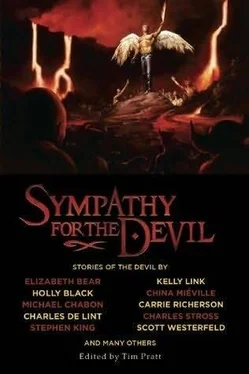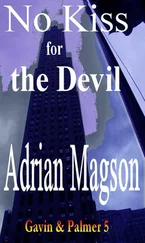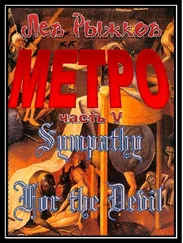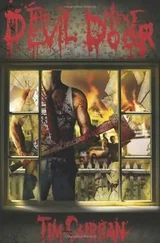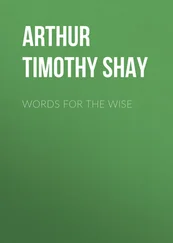Around four o’clock in the morning, I woke and was conscious of someone in the room with me. There was an unmistakable tang of sea in the air. My eyesight is poor and it took me a while to make him out in the darkness, though he was standing just beside my bed, with his long thin arm snaked under my pillow, creeping around. I lay perfectly still, aware of the tips of this slender shadow’s fingernails and the scrape of his scaly knuckles, as he riled the contents of my head and absconded with them through the bedroom window, which was somehow also the mouth of the Neighborsburg Caverns, with tiny of Colonel Earnshaw taking tickets in the booth.
I awakened now in truth, and reached immediately under the pillow. The books were still there. I returned them to the evidence room at eight o’clock this morning. At nine, there was a call from Dolores and Victor Abbott, at their motor lodge out on the Plunkettsburg Pike. A guest had made an abrupt departure, leaving a mess. I got into a car with Ganz and we drove out to get a look. The Ashtown police were already there, going over the buildings and grounds of the Vista Dolores Lodge. The wastebasket of Room 201 was overflowing with blood-soaked bandages. There was evidence that the guest had been keeping some kind of live bird in the room; one of the neighboring guests reported that it had sounded like a crow. And over the whole room there hung a salt smell that I recognized immediately, a smell that some compared to the smell of the ocean, and others to that of blood. When the pillow, wringing wet, was sent up to Pittsburgh for analysis by Mr. Espy, it was found to have been saturated with human tears.
When I returned from court, late this afternoon, there was a message from Dr. Sauer. He had completed his postmortem and wondered if I would drop by. I took the bottle from behind Daniel Webster and headed on down to the county morgue.
“He was already dead, the poor son of a biscuit eater,” Dr. Sauer said, looking less morose than he had the last time we spoke. Sauer was a gaunt old Methodist who avoided strong language but never, so long as I had known him, strong drink. I poured us each a tumbler, and then a second. “It took me a while to establish it because there was something about the fellow that I was missing.”
“What was that?”
“Well, I’m reasonably sure that he was a hemophiliac. So my reckoning time of death by coagulation of the blood was all thrown off.”
“Hemophilia,” I said.
“Yes,” Dr. Sauer said. “It is associated with inbreeding, as in the case of royal families in Europe.”
Inbreeding. We stood there for a while, looking at the sad bulk of the dead man under the sheet.
“I also found a tattoo,” Dr. Sauer added. “The head of a grinning baboon. On his left forearm. Oh, and one other thing. He suffered from some kind of vitiligo. There are white patches on his nape and throat.”
Let the record show that the contents of the victim’s makeup kit, when it was inventoried, included cold cream, rouge, red greasepaint, a powder puff, some brushes, cotton swabs, and five cans of foundation in a tint the label described as “Olive Male.” There was no trace, however, of the white greasepaint with which clowns daub their grinning faces.
Here I conclude my report, and with it my tenure as district attorney for this blighted and unfortunate county. I have staked my career-my life itself-on the things I could see, on the stories I could credit, and on the eventual vindication, when the book was closed, of the reasonable and skeptical approach. In the face of twenty-five years of bloodshed, mayhem, criminality, and the universal human pastime of ruination, I have clung fiercely to Occam’s razor, seeking always to keep my solutions unadorned and free of conjecture, and never to resort to conspiracy or any kind of prosecutorial woolgathering. My mother, whenever she was confronted by calamity or personal sorrow, invoked cosmic emanations, invisible empires, ancient prophecies, and intrigues; it has been the business of my life to reject such folderol and seek the simpler explanation. But we were fools, she and I, arrant blockheads, each of us blind to or heedless of the readiest explanation: that the world is an ungettable joke, and our human need to explain its wonders and horrors, our appalling genius for devising such explanations, is nothing more than the rim shot that accompanies the punch line.
I do not know if that nameless clown was the last, but in any case, with such pursuers, there can be few of his kind left. And if there is any truth in the grim doctrine of those hunters, then the return of our father Yrrh, with his inscrutable intentions, cannot be far off. But I fear that, in spite of their efforts over the last ten thousand years, the followers of Ai are going to be gravely disappointed when, at the end of all we know and everything we have ever lost or imagined, the rafters of the world are shaken by a single, terrible guffaw.
The King of the Djinn by David Ackert and Benjamin Rosenbaum
Grinding and roaring, the sixteen-wheeler crested a great dune, and Musa rejoiced: there on the horizon, the Mediterranean glittered, blue as Heaven. “God is great!” he shouted as he shifted into second for the downgrade.
Each week, Musa made this trip, carrying a ton of devilish black carbonated soda from the bottling plant of El-Nasr to the decadent tongues of Cairo. And each week, when he reached the open road, his heart threw off its burdens.
In the town, the nights were empty and cold. He’d awaken again and again to the sudden emptiness of his house-his wife Suha dead, his son Jamal away at university. The days were full of packing and loading and tinkering, activity and worry. The men of the bottling plant were always asking Musa for blessings, for amulets, for the resolution of disputes. They’d found out, somehow, that he’d once studied Qur’an and Hadith in the great merkab in Cairo. Sometimes he even had the odd sense that they knew about his meetings with the King of the Jinn. He never knew what to say to them.
On the road, Musa was with God alone. He prayed without words as he drove, using only his breath, opening himself to God as the great bounty of the world came into focus. Every blinding white grain of sand reflected God’s glory at Musa; the blue vault of the heavens was filled with God’s breath. The roaring engine of the semi and the black ribbon of the highway testified to the great genius God had entrusted in man. Whenever Musa saw a camel or a goat or a date tree in the sand beyond the highway, it was full of life, full to bursting, and the life in it reached out into Musa’s heart and whispered to him: we are one.
The King of the Jinn had been right. It was he who had told Musa to abandon the academy, that his soul was starving. Musa had given his inheritance to charity, dropped out of the merkab, and found this simple work. For forty years, he had devoted himself to the secret path of the breath. He slowed down enough for God to find him, and God took Musa in the palm of His hand and held him there. Even at Suha’s death, God’s love of Musa never wavered; Musa cried like a woman at her graveside, and God held him with strong arms and kept him safe from despair.
Now Musa could see tiny white flecks against the sea’s blue. Whitecaps dancing. The road turned parallel to the shore.
As for the King of the Jinn: Musa was not sure, of course, that he really was the King of the Jinn. That was just a guess. He called himself “Gil”.
But since 1952, when they had met in a café in the student quarter, Musa had become an old man, and Gil had not aged a day. Gil looked like a Persian, but he spoke a fluent and elegantly complex classical Arabic, the way no one had spoken it since the time of the Prophet. And in Gil’s eyes, Musa saw the kind of fearlessness men had only when they were young and arrogant, or old and dying. Yet Gil possessed it all the time.
Читать дальше
